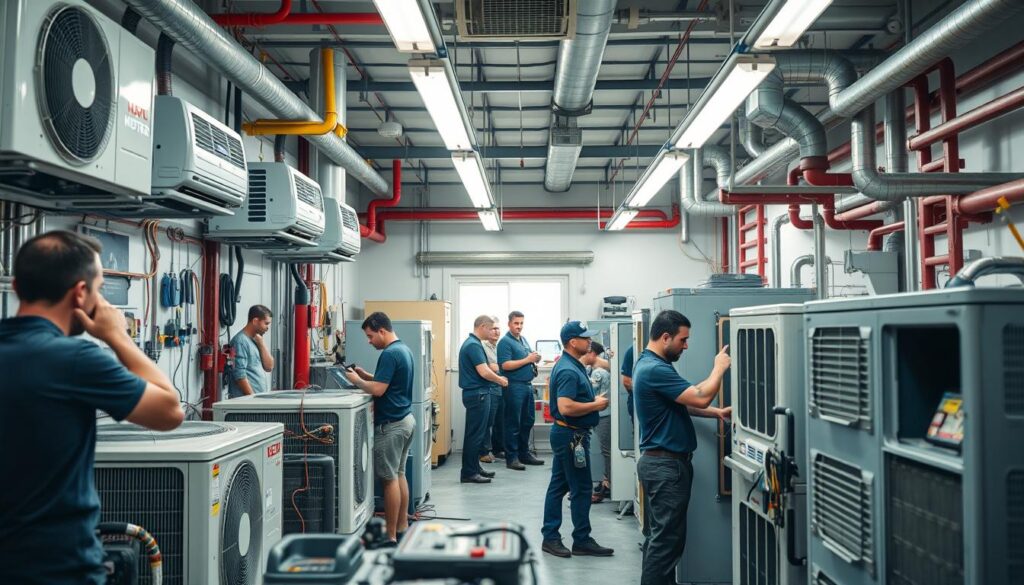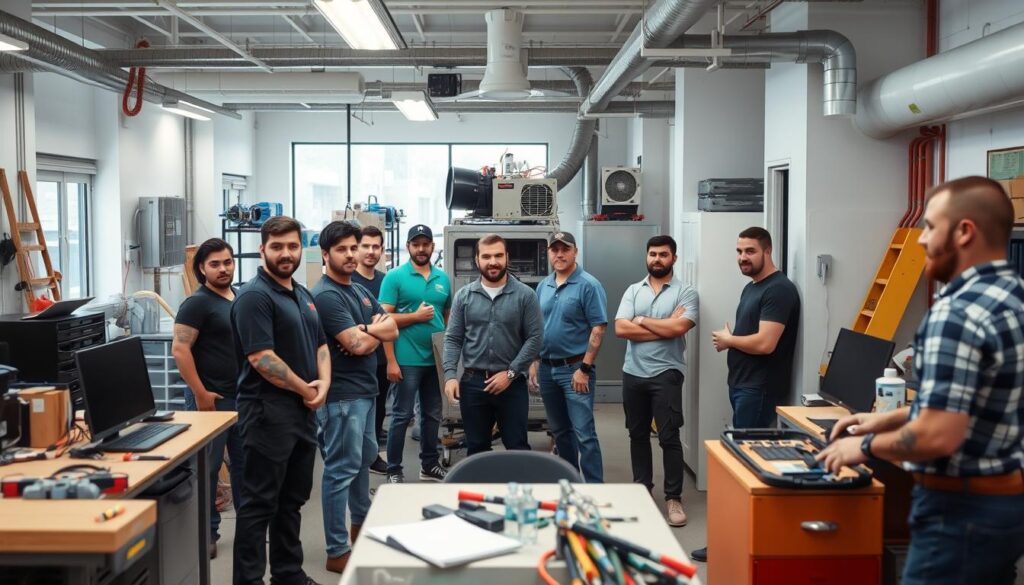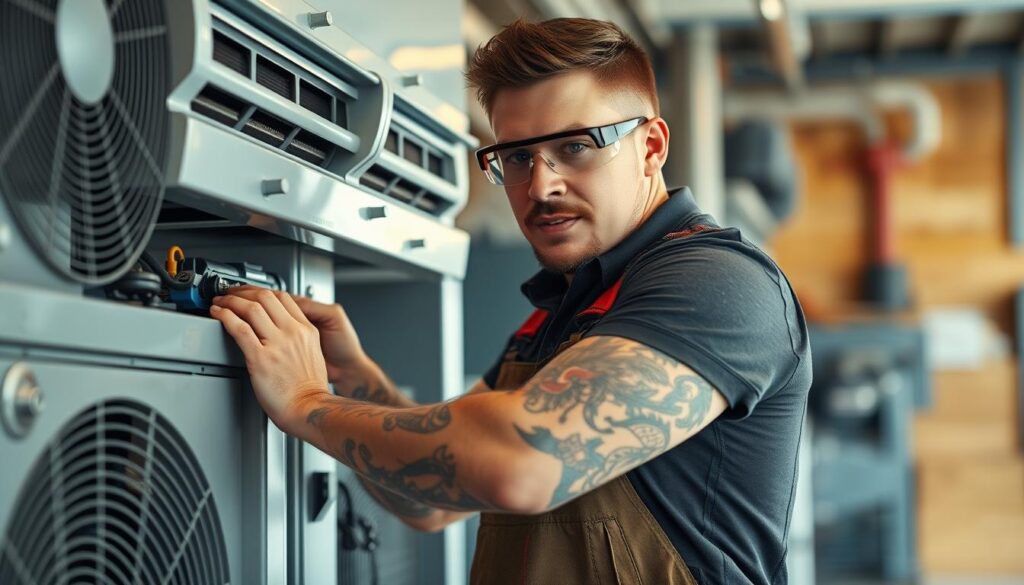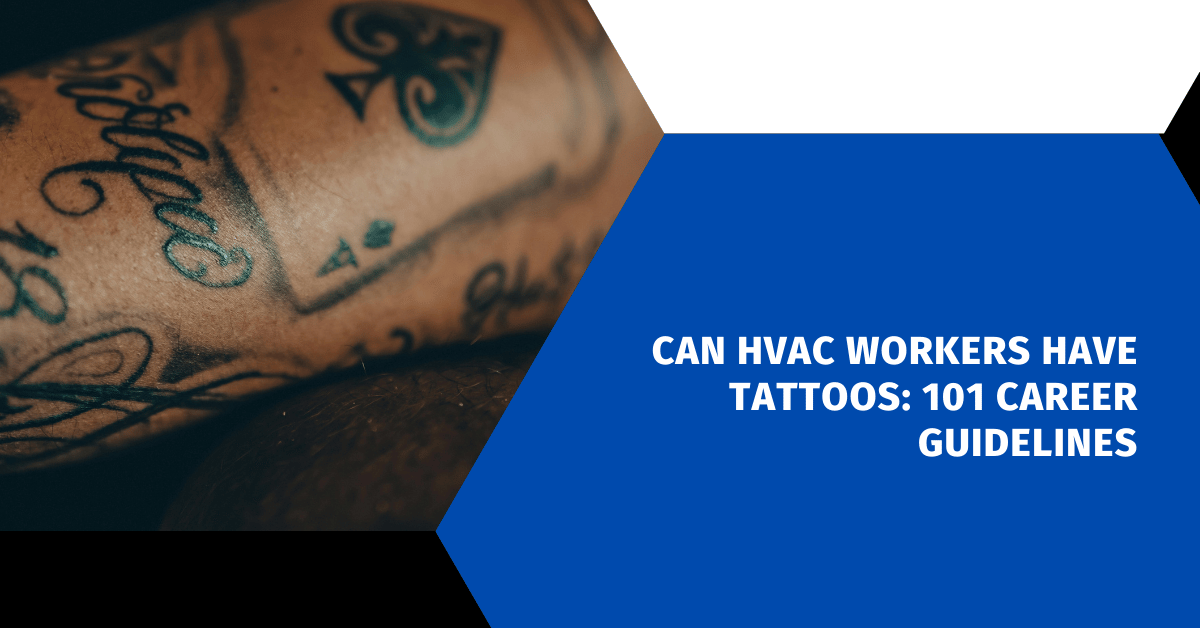Affiliate Disclosure
HVAC Guide Guys is a participant in the Amazon Services LLC Associates Program, an affiliate advertising program designed to provide a means for sites to earn advertising fees by advertising and linking to Amazon.
Can HVAC Workers Have Tattoos? In the HVAC industry, a common question is whether tattoos are okay. As views on body art change, HVAC workers face new rules on how they look. Can you show off your tattoos at work, or should you stick to a more traditional style? Let’s look at the rules and trends in the HVAC world to help you decide.

Key Takeaways
- The HVAC industry is evolving in its acceptance of tattoos, with some employers being more open-minded while others prefer a conservative appearance.
- The impact of tattoos on career prospects varies based on company policies, customer demographics, and the nature of the tattoos.
- HVAC workers with tattoos should consider covering them during job interviews and client interactions to maintain a professional image.
- Appearance is crucial for HVAC technicians, as they only have one chance to make a good first impression with clients.
- Moderation is key when it comes to body modifications like tattoos and piercings in the HVAC industry.
Table of Contents
Understanding Today’s HVAC Industry and Body Art
The HVAC industry is changing, and so is how people view tattoos at work. Tattoos are becoming more accepted, but the HVAC field is still cautious. Here, professional standards and what customers think are key in hiring and career paths.
Current Statistics on Tattoos in the Workplace
In the U.S., more people are getting tattoos. By 2006, almost one-quarter of adults had at least one. By 2010, 38% of 18- to 29-year-olds had visible tattoos. But, only 6% of those 65 and older have tattoos.
Changing Industry Perspectives
The HVAC industry has always valued a professional look. Visible tattoos were seen as a problem in hiring. But, some employers are now more open to tattoos in the workplace.
Professional Standards Evolution
Even with changing views, the HVAC industry still wants a clean, professional look. Tattoos can make some customers uncomfortable. So, the industry’s dress codes are evolving to balance acceptance with a trustworthy image.
Explore Our HVAC Shop
Looking for top-rated HVAC tools, parts, and accessories? Visit our shop and find the perfect solution for your needs.
Visit the ShopCan HVAC Workers Have Tattoos: The Complete Answer
In the HVAC world, many wonder if tattoos are okay for workers. The answer isn’t just yes or no. It depends on things like company rules, professional standards, and what clients expect.
Many HVAC companies now see tattoos as more accepted. If tattoos aren’t too bold or distracting, most employers are okay with them. But, it’s important to ask each employer about their tattoo rules.
Being professional and following company rules is key for showing tattoos in HVAC. Some jobs might need tattoos covered, especially if you meet clients. This is because looking professional is very important.
| Employer Tattoo Policy | Percentage of HVAC Companies |
|---|---|
| Allows visible tattoos | 55% |
| Requires tattoos to be covered | 35% |
| Prohibits tattoos | 10% |
The HVAC field is changing, and tattoos might become more accepted. Yet, HVAC workers should always think about company rules. They should also act professionally, no matter their personal style.
To wrap it up, HVAC workers can have tattoos. But, how accepted they are depends on many things. By knowing the industry’s norms and following company rules, HVAC pros can make sure tattoos don’t hold them back in their careers or harm their professional relationships.
Explore Our HVAC Shop
Looking for top-rated HVAC tools, parts, and accessories? Visit our shop and find the perfect solution for your needs.
Visit the ShopFirst Impressions and Customer Interaction
In the HVAC world, first impressions count a lot. How an HVAC technician looks, including tattoos, can really affect customer perception and trust. Some customers might not mind tattoos, but others might feel uneasy with a professional image that’s not traditional.
Impact on Client Trust
Customers often judge an HVAC technician’s appearance quickly. Visible tattoos might seem unprofessional, which can lower the customer’s trust in the technician’s abilities. Keeping a neat, professional image is key to building strong client relationships and ensuring a good customer perception.
Professional Appearance Standards
HVAC companies often have clear professional appearance standards. They want technicians to look clean-cut and well-groomed. This approach helps cater to different customer demographics and preferences, making technicians seem trustworthy and skilled. Even though tattoos are more accepted in some jobs, the HVAC industry might stick to more traditional appearance guidelines.
Customer Demographics and Preferences
The customer demographics and preferences in a certain area can shape the professional image expected of HVAC technicians. In some places, visible tattoos are okay, while in others, a more conservative look is preferred. Technicians should know the local customer perception and adjust their professional image accordingly.
| Factors Influencing Customer Perception | Impact on Trust and Satisfaction |
|---|---|
| HVAC Technician Appearance (including tattoos) | Affects customer’s level of trust in the technician’s skills and expertise |
| Professional Appearance Standards | Helps build stronger relationships with clients and ensures a positive customer perception |
| Customer Demographics and Preferences | Influences the professional image HVAC technicians are expected to maintain |
Company Policies and Employment Opportunities
In the HVAC industry, tattoo policies vary a lot. Some employers have strict rules against visible tattoos, while others are more relaxed. It’s important for job seekers to check a company’s tattoo policy before applying. This is because some jobs might not be available for those with tattoos.
The HVAC industry is slowly getting more accepting of tattoos. This change reflects the growing number of people with tattoos in many fields. Even though looks and professionalism matter, skills and knowledge are more important. Some companies even give their technicians a uniform package with their logo.
But, some HVAC companies still have strict rules. They might ask you to cover your tattoos while working. Supervisors check uniforms often to make sure everyone follows the rules. Wearing jewelry is also not allowed because it can be dangerous.
Despite these rules, many tattooed HVAC workers have shown they are skilled and trustworthy. They have won over clients and colleagues by doing great work and talking openly. Their tattoos have even helped build trust and teamwork in the HVAC field.
The HVAC industry’s view on tattoos is changing slowly. Job seekers should be ready to talk about their tattoos when applying. Current HVAC workers can find ways to cover their tattoos to meet company rules and build good relationships with clients.

“Tattoos have become increasingly common in the HVAC industry, and many employers are more focused on skills and professionalism than physical appearance.”
Explore Our HVAC Shop
Looking for top-rated HVAC tools, parts, and accessories? Visit our shop and find the perfect solution for your needs.
Visit the ShopVisible vs. Covered Tattoos in HVAC Work
As an HVAC pro, you might want to show off your tattoos or keep them hidden. This depends on your workplace’s dress code and standards. Knowing how tattoos are viewed in HVAC can help you balance personal style with professionalism.
Workplace Dress Codes
Many HVAC companies have rules about tattoos. Some allow tattoos that are discreet or easy to cover. Others have strict rules against any visible tattoos. It’s important to know your employer’s rules to follow them.
Strategic Covering Options
If you need to cover your tattoos, you have a few choices. You can wear long-sleeved shirts, use bandages, or try special makeup. Looking into tattoo covering techniques can help you find the best way for your job.
Seasonal Considerations
Season can affect how you cover your tattoos, especially in summer. Working in the heat, you’ll want clothes that are light but still cover your tattoos. This keeps you looking professional and feeling comfortable.
| Industry | Tattoo Acceptance Level |
|---|---|
| Creative fields | More accepting |
| Skilled labor | More accepting |
| Restaurant industry | More accepting |
| Healthcare | Less accepting |
| Law enforcement | Less accepting |
| Financial institutions | Less accepting |
| Government | Less accepting |
| Sales roles | Less accepting |
| Management roles | Less accepting |
The HVAC industry is changing, and employers are getting more open about HVAC uniform policies and tattoo visibility. By understanding your workplace’s rules and finding good covering options, you can look professional while still showing your style.
Job Interview Strategies for Tattooed Professionals
Tattoos are becoming more common in the workplace. HVAC professionals with tattoos need to be confident and professional during job interviews. It’s wise to cover visible tattoos to make a good first impression.
Your main goal in the interview is to show off your skills and experience. Avoid letting your tattoos be the focus. Wait until you’re offered the job to talk about your tattoos. This way, your skills and qualifications get the spotlight.
If tattoos come up, be ready to talk about them politely. Explain how they don’t impact your job performance. Show that your skills and experience are what matter most in the interview.
By focusing on your professional presentation and qualifications, you can succeed in the HVAC job market. Let your skills and expertise be the main focus, not your tattoos. This approach helps you stand out positively.
“Tattooed individuals, especially white-collar workers and women, face a perceived lack of professionalism in the workplace.”
Safety Considerations and Regulations
Having tattoos does not pose a big risk or affect HVAC equipment. HVAC workers should still follow health and safety rules, even with tattoos.
Equipment Operation Guidelines
HVAC pros with tattoos can use all needed tools and gear safely. Tattoos don’t change how these items work. Following safety rules means tattoos won’t be a problem at work.
Health and Safety Protocols
All HVAC workers must stick to strict health and safety rules. This includes keeping clean, wearing the right PPE, and following safe work practices. Fresh tattoos need extra care to avoid infection, but this is a general rule, not specific to HVAC.
The Health and Safety Manual for HVAC has detailed guidelines for safety. It has been updated several times since 2009. It covers many safety topics, like how to use equipment, handle hazardous materials, respond to emergencies, and keep workers healthy.
By focusing on safety and following the industry’s rules, HVAC workers with tattoos can help keep the workplace safe and productive. They can do this just like their colleagues without tattoos.
| Safety Guideline | Requirement |
|---|---|
| Personal Protective Equipment (PPE) | Mandatory usage of gloves, goggles, and steel-toed boots |
| Hazardous Materials Handling | Proper training and adherence to safety protocols |
| Lockout/Tagout Procedures | Strict implementation to prevent accidental machine activation |
| Electrical Safety | Compliance with OSHA regulations and industry best practices |
Explore Our HVAC Shop
Looking for top-rated HVAC tools, parts, and accessories? Visit our shop and find the perfect solution for your needs.
Visit the ShopCareer Advancement with Tattoos
In the HVAC industry, tattoos don’t stop your career growth. Many HVAC pros with tattoos have done well. What really matters is your skills, knowledge, and experience. But, those who deal with customers or manage teams might face more scrutiny about their tattoos.
To beat biases about tattoos, keep improving your skills and do great work. Get industry certifications, go to training, and learn more about HVAC. Also, being known for reliability, solving problems, and great customer service helps a lot. This shows you’re serious about your career and tattoos don’t hold you back.
| HVAC Career Growth | Tattoo Acceptance | Professional Development |
|---|---|---|
|
|
|
By focusing on your professional growth and doing great work, you can succeed in HVAC, tattoos or not. Your skills and performance are what really drive your career forward.

Best Practices for Current and Aspiring HVAC Technicians
Being an HVAC technician means building a strong professional image. This is true whether you have tattoos or not. Focus on doing great work and providing top-notch customer service. This way, you become known as a reliable and skilled HVAC expert.
Professional Development Tips
It’s key to keep up with the latest in HVAC. Take part in training, go to industry events, and get certifications like EPA 608 and NATE. These steps improve your skills and make you more valuable to your employer or clients.
Building a Strong Reputation
- Maintain a neat and clean appearance. Wear professional and clean work clothes, even if your tattoos are hidden. This makes a good first impression and shows you’re serious about your job.
- Focus on exceptional customer service. Always be respectful, patient, and eager to help your clients. Good service can lead to positive reviews and more work.
- Seek mentorship opportunities. Find experienced HVAC pros or leaders for advice and support. Networking can open new doors and help you grow.
By following these tips, HVAC technicians can build a strong professional image. This is true even if you have tattoos. Keep improving your skills and always aim for excellent customer service to succeed in HVAC.
Conclusion
The HVAC industry is changing, and tattoos are becoming more accepted among workers. But, how much acceptance can vary a lot. As a tattooed HVAC worker, being professional and skilled is key. You might need to hide your tattoos sometimes to follow company rules and keep clients happy.
As society’s views on tattoos change, their impact on HVAC jobs will likely lessen. Your success in HVAC will depend more on your skills and service than on your tattoos. Keep up with industry trends, know your company’s rules, and always do great work. This way, you can thrive in the HVAC world with tattoos.
The HVAC industry is slowly accepting tattoos, so it’s vital for workers to stay updated. Keep your appearance professional, focus on safety, and keep improving your skills. This will help you succeed in this exciting field, no matter your style.

